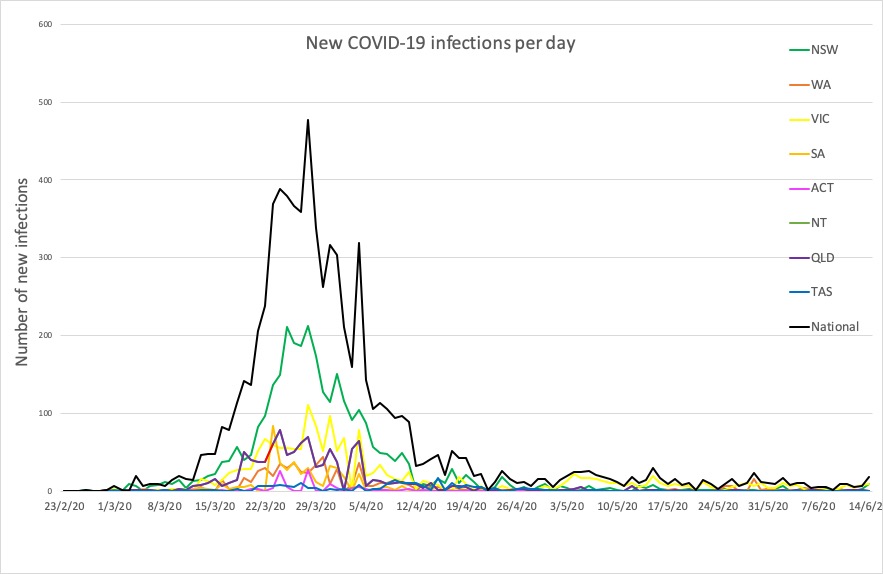As Victoria reports a case of COVID-19 in a GP who worked at three practices while asymptomatic, the RACGP has put out advice on what to do if a team member is diagnosed with the disease
Thanks for joining us on The Medical Republic‘s live COVID-19 blog.
Got any tips, comments or feedback? Email me at bianca@biancanogrady.com
The latest
- Afternoon update: RACGP advice on how to handle COVID-19 infection in a team member, and ‘heavy breathing in close proximity’ linked to superspreader events in Japan.
- Morning update: US FDA withdraws hydroxychloroquine’s ’emergency use’ authorisation, Australian COVID-19 guidelines updated with paediatric disease severity definitions.
- The latest confirmed COVID-19 infection figures for Australia.
- As Victoria reports a case of COVID-19 in a GP who worked at three practices while asymptomatic, the RACGP has put out advice on what to do if a team member is diagnosed with the disease. The advice covers questions such as how to manage possible exposure to other staff and patients, consulting via telehealth during self-isolation, how to clean the practice, and how to communicate with patients about the situation.
- Healthcare and care facilities, bars and restaurants, workplaces, live music venues and gyms are the most likely locations for so-called COVID-19 ‘superspreader’ events; a cluster of five or more cases linked to a common event or venue.
A study published in Emerging Infectious Diseases analysed all confirmed COVID-19 infections reported in Japan from January 15 to April 4 – amounting to 3,184 cases – and looked at the possible source of infection, contacts and travel history.
Among these cases, researchers identified 61 clusters, 30% of which were associated with healthcare facilities, 16% were associated with other care facilities including nursing homes and day care centres, 16% were associated with restaurants and bars, 13% with workplaces, 11% with music-related events, and 8% with gyms.
“We noted many COVID-19 clusters were associated with heavy breathing in close proximity, such as singing at karaoke parties, cheering at clubs, having conversations in bars, and exercising in gymnasiums,” the authors wrote. In Japan, the government has issued advice that people avoid closed spaces with poor ventilation, crowded places, and close-contact settings.
- The US Food and Drug Administration has revoked the emergency-use authorisation it granted to Trump’s favourite COVID-19 cure-all hydroxychloroquine and chloroquine, based on emerging evidence that it doesn’t actually work for COVID-19 after all.
In a statement, the FDA said it no longer believed that the drug has an antiviral effect, earlier observations of decreased viral shedding had not been replicated, and recent randomised controlled trial evidence found no benefit compared to usual care. - The National COVID-19 Clinical Evidence Taskforce has updated the definitions of COVID-19 disease severity in children, and added advice on tracheostomy in mechanically ventilated adults, to the Australian ‘living guidelines’ on COVID-19.
- Another to add to the growing collection of Unusual Benefactors during the COVID-19 pandemic (which, TBH, so far only consists of Dolly Parton for her generous donation to aid COVID-19 vaccine research): TikTok – the popular video app – has donated US$2 million donation to the Peter Doherty Institute of Infection and Immunity, to support their COVID-19 research.
- Victoria is dealing with two new local outbreaks of COVID-19, one of which is linked to a patient of Monash Health and the other to an extended family in Melbourne. Two individuals from the family outbreak are students at St Dominic’s Primary School in Broadmeadows, and were likely infectious when they attended school between 26 May and 3 June, according to the Victorian health department. The school is currently closed for cleaning, and students and staff who attended during that period are being tested.
Here are the latest figures for confirmed COVID-19 infections around Australia to 9pm yesterday:
National – 7335, with 102 deaths and 6851 recovered
ACT – 108
NSW – 3131
NT – 29
QLD – 1065
SA – 440
TAS – 228
VIC – 1732
WA – 602




